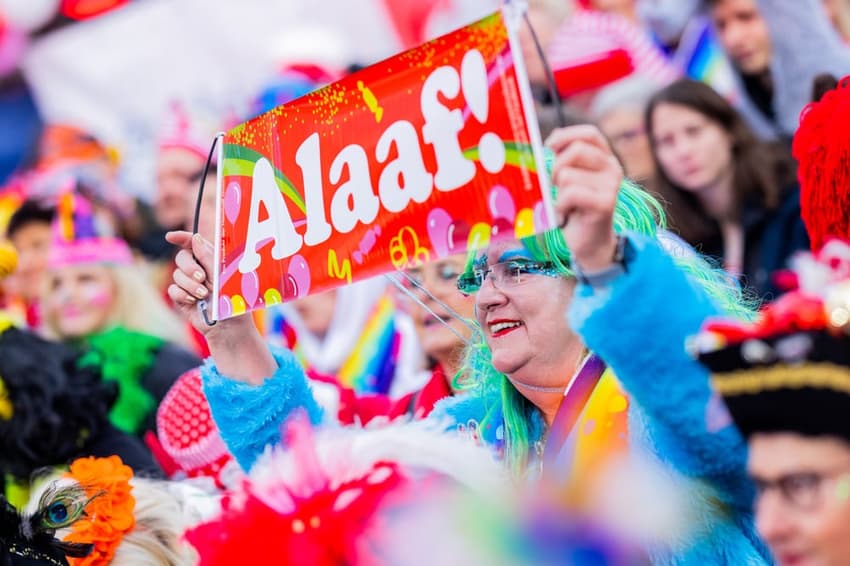10 German words you need to know for Cologne's 'Karneval'

Karneval in Cologne kicks off on Thursday, February 8th. Read The Local’s guide to the local slang that’ll make you sound like a seasoned veteran.
If you make it to the big Carnival event in Cologne, which stretches from Thursday, February 8th until Wednesday, February 13th, here is all the vocabulary you need to blend in with the locals.
Alaaf is Cologne’s Narrenruf - what revellers shout to each other on the street. It can be done in one of two ways. Either you shout Köln and the other person shouts Alaaf back, or you shout Alaaf and your interlocutor will mirror your call.

Jecken celebrate the start of Carnival in Cologne on November 11th, 2022. Photo: picture alliance/dpa | Rolf Vennenbernd
Never mix this up with Helau, which is called in rival Düsseldorf - as this song shows, you might just miss out on the night of your life.
Karneval (or Fasching as it’s know in the south) is celebrated in most of Germany except the north and each city has its own Narrenruf, with Stuttgart’s Komma Gschwomma being one of the most wacky.
Rosenmontag is the high point of the Karneval. It includes hundreds of floats passing through the centre of town and will be attended by upwards of a million people. Floats come in all shapes and sizes and often take the form of satirical depictions of current political hot potatoes.
Büttenrede - a speech held during Karneval. They are supposed to be witty and often rhymne and are given from a pulpit which looks like a barrel, the local word for which is Bütt. These speeches go all the way back to the Middle Ages, when it was the only time when the simple man was allowed to criticize his overlords.
Bützchen. Karneval is a festival of excess with lots of booze and love to go around. Expect to at least be kissed on the cheeks by total strangers. This form of greeting is known as bützchen, it can be given on the cheek or the mouth. Even public officials - from police to major - have to put up with being given a Butzje. To reject them is seen as rude.
Immi is the Cologne abbreviation for immigrant and refers to anyone travelling to the metropolis from outside - so whether you’re from Möchengladbach or Madrid, you still qualify as an immi in the eyes of someone from Cologne.
Jecken are all the people that go to the pub and onto the streets to celebrate Karneval. The word means jester (in other cities the word Narr is used) and shows the history of the festival. It dates back to the medieval times, and even in those days people liked to dress up and play the fool.
READ ALSO: What you need to know about celebrating Carnival in Germany

Costume-clad Revellers kick off the start of Karnival season in Cologne in November. Photo: picture alliance/dpa | Rolf Vennenbernd
Kamelle are the sweets that are thrown down from floats on Rosenmontag. The call of Kamelle will go up and you will be showered with goodies, from chocolates to gummy bears.
Geisterzug. Carnival has been cancelled many times across the years, most recently in 1991 because of the Gulf War. But someone Cologners went ahead with it anyway under the motto “Kamelle statt Krieg” (sweets instead of war) - from that year on the Geisterzug (ghost parade) has taken place at night - this is a must see.
Krätzchen is a type of joke beloved in the Rhineland. Rather than Berliners with their stone dry humour, Rhinenlanders like to tell short jokes with a punch line. This is often done on stage at bars throughout cities during Karneval. To other Germans they induce a groan - but since they’re told in thick Rhine dialect you’re not likely to understand them anyway.
Stippeföttche - if you see two men rubbing their bums together don’t be surprised, you’re just witness to the Stippeföttche, a special Cologne dance. In the unusual caper two men stand back to back with one another and rub their backs and bottoms up against one another.
SEE ALSO: Karneval: The party that makes Oktoberfest look civilized
Comments
See Also
If you make it to the big Carnival event in Cologne, which stretches from Thursday, February 8th until Wednesday, February 13th, here is all the vocabulary you need to blend in with the locals.
Alaaf is Cologne’s Narrenruf - what revellers shout to each other on the street. It can be done in one of two ways. Either you shout Köln and the other person shouts Alaaf back, or you shout Alaaf and your interlocutor will mirror your call.

Never mix this up with Helau, which is called in rival Düsseldorf - as this song shows, you might just miss out on the night of your life.
Rosenmontag is the high point of the Karneval. It includes hundreds of floats passing through the centre of town and will be attended by upwards of a million people. Floats come in all shapes and sizes and often take the form of satirical depictions of current political hot potatoes.
Büttenrede - a speech held during Karneval. They are supposed to be witty and often rhymne and are given from a pulpit which looks like a barrel, the local word for which is Bütt. These speeches go all the way back to the Middle Ages, when it was the only time when the simple man was allowed to criticize his overlords.
Bützchen. Karneval is a festival of excess with lots of booze and love to go around. Expect to at least be kissed on the cheeks by total strangers. This form of greeting is known as bützchen, it can be given on the cheek or the mouth. Even public officials - from police to major - have to put up with being given a Butzje. To reject them is seen as rude.
Immi is the Cologne abbreviation for immigrant and refers to anyone travelling to the metropolis from outside - so whether you’re from Möchengladbach or Madrid, you still qualify as an immi in the eyes of someone from Cologne.
Jecken are all the people that go to the pub and onto the streets to celebrate Karneval. The word means jester (in other cities the word Narr is used) and shows the history of the festival. It dates back to the medieval times, and even in those days people liked to dress up and play the fool.
READ ALSO: What you need to know about celebrating Carnival in Germany

Kamelle are the sweets that are thrown down from floats on Rosenmontag. The call of Kamelle will go up and you will be showered with goodies, from chocolates to gummy bears.
Geisterzug. Carnival has been cancelled many times across the years, most recently in 1991 because of the Gulf War. But someone Cologners went ahead with it anyway under the motto “Kamelle statt Krieg” (sweets instead of war) - from that year on the Geisterzug (ghost parade) has taken place at night - this is a must see.
Krätzchen is a type of joke beloved in the Rhineland. Rather than Berliners with their stone dry humour, Rhinenlanders like to tell short jokes with a punch line. This is often done on stage at bars throughout cities during Karneval. To other Germans they induce a groan - but since they’re told in thick Rhine dialect you’re not likely to understand them anyway.
Stippeföttche - if you see two men rubbing their bums together don’t be surprised, you’re just witness to the Stippeföttche, a special Cologne dance. In the unusual caper two men stand back to back with one another and rub their backs and bottoms up against one another.
SEE ALSO: Karneval: The party that makes Oktoberfest look civilized
Join the conversation in our comments section below. Share your own views and experience and if you have a question or suggestion for our journalists then email us at [email protected].
Please keep comments civil, constructive and on topic – and make sure to read our terms of use before getting involved.
Please log in here to leave a comment.